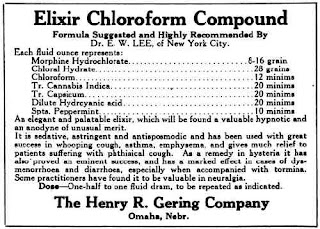As so often happens, while researching my last post, I came upon something that distracted me from what I had originally planned to write about next. In fact, several somethings, but I'll start with one, the Henry R. Gering Company and the way drugs go in and out of fashion.
I was perusing a 1914 (Vol. 19, #1) issue of the Western Medical Review on Google Books, which contained quite a few fascinating ads for companies or institutions operating or based in Omaha or other Nebraska cities (probably because the Review's founder was a Nebraska-based surgeon, George H. Simmons), most of them more or less medical-related. The Henry R. Gering Company in particular had numerous ads for different products (probably because Henry was a managing trustee for the Review). The one that first caught my eye was eye-catching indeed:
Get your deformities fixed! Actually, this outfit is quite appealing in a Goth kind of way...Although presumably in 1914 the wearer would have put a dress on over it. I'd like to see their other "deformity appliances."
This ad had the best art (although the illustrations for some of the ads for abdominal supporters do inspire awe), but some of Henry Gering's other products were even more interesting, and recall a time when people would dose themselves with almost anything. (Actually, has anything changed?)
There was this mixture, for example, which looks interesting to begin with, and is probably even more interesting when you add heroin to it, as the advertisement suggests (with the sanction of the Pure Food and Drugs Act of 1906):
Another popular remedy was cannabis. Yes, marijuana, pot, weed. Henry R. Gering was still advertising a cannabis concoction in 1921 (again in the Western Medical Review), although John Geluardi, in Cannabiz: The Explosive Rise of the Medical Marijuana Industry (available for check-out at Omaha Public Library), mentions that by the 1920s the use of marijuana, medical or otherwise, was beginning to worry a few people, and it was actually banned in California (of all places). Before that, however, cannabis extracts were widely available as over-the-counter remedies for everything from asthma (yep!) to "hysteria"; Queen Victoria used it for menstrual cramps. Ah, those were the days.....
 | |
| J.P. Cooke building, address of Henry R. Gering & Co. |
I was somewhat shocked to discover we had no biographical file in our Nebraska Reference department on Henry R. Gering, so I had to start from scratch. Henry was the son of German immigrants, Paul and Amelia Gering, and was born in 1868 in Cedar Rapids, Iowa, although the family later moved to Plattsmouth, Nebraska, and seem to have done very well there. (Their house is on the National Register of Historic Places). Henry became a pharmacist and his brother Matthew a lawyer. The two girls, Mia and Barbara, never married (going by the census). Henry was a busy fellow--ran a pharmacy in Plattsmouth, was elected mayor there in 1904 after serving as city treasurer, was a member of the State Pharmacy Board, Chairman of the Democratic Central Committee, and Secretary of the Board of Trade (all this from the Semi-Centennial History of Nebraska [1904]); newspapers of the early 1900s indicate he was active in the Democratic Party. He was also quite busy in the Nebraska State Medical Association. In 1909, Henry is in the Omaha city directory as president of the Porter-Ryerson-Hoobler Co. (a drug company that replaced the Mercer Chemical Company of Omaha in 1902). By 1910, the company had become The Henry R. Gering Company, at 1315 Howard Street (which local readers may recognize as the J.P. Cooke Building).
In both 1909 and 1910, Mila U. Gering was listed as the company's secretary-treasurer. Both Henry and Mila boarded at the Rome Hotel (Henry was still there in the 1920 and 1930 censuses). I'm pretty sure that "Mila" was Henry's older sister, Mia U. Gering--although the 1910 census listed her at home with her mother, brother Matthew, and sister Barbara in Plattsmouth, where she worked as clerk in the county treasurer's office--an office where she may have started out working under brother Henry. Did big sister ever get annoyed at always playing second fiddle--I mean secretary--to her little brother?
 It doesn't look as though Henry married, though I'm coming up short on his later life. That's not to say he didn't like women--he was involved in a court case that arose as a result of his romantic indiscretion, and was defended by his brother, the lawyer.
It doesn't look as though Henry married, though I'm coming up short on his later life. That's not to say he didn't like women--he was involved in a court case that arose as a result of his romantic indiscretion, and was defended by his brother, the lawyer.From Lincoln Daily News, 21 May 1912.
There is much more we could say about Henry and his family, but I've strayed pretty far from the weird ads in the Western Medical Review. I'll save the genealogy for another day.



No comments:
Post a Comment